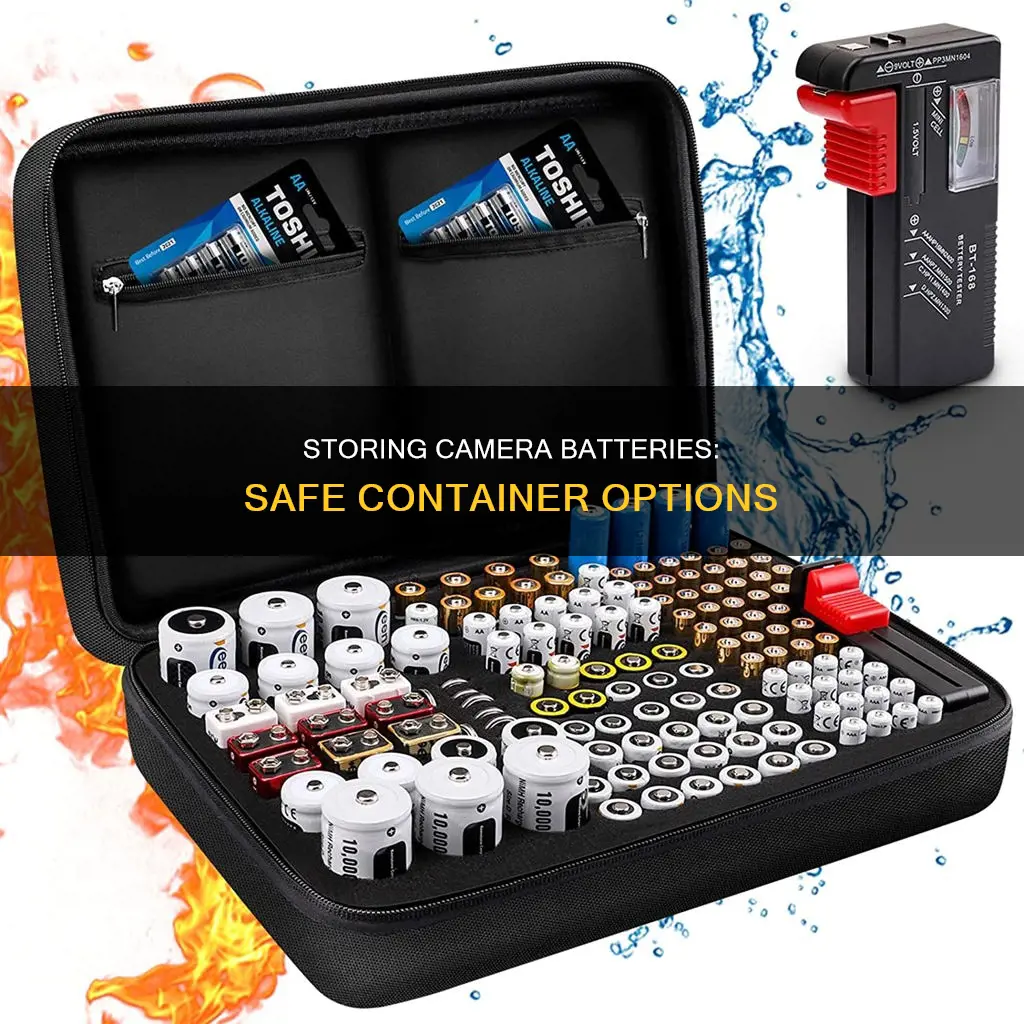
Camera batteries are expensive and keeping them safe is essential. The market offers a wide range of battery storage containers designed to protect your camera batteries from dirt, scrapes, moisture, and short circuits. These containers are made of materials such as plastic or fabric and come in various sizes and colours. Some are designed to hold specific battery sizes, while others cater to multiple sizes. They can be purchased from online retailers like Amazon and B&H, as well as specialist camera stores.
| Characteristics | Values |
|---|---|
| Container type | Plastic box or bag |
| Container placement | Dry, well-ventilated area, room temperature |
| Container contents | Only one type of battery (empty or full) |
| Battery contacts | Covered with electrical tape or placed in original packaging |
What You'll Learn

Keep batteries in a cool, dry place
Keeping batteries cool, dry, and well-ventilated is essential for safe storage. Batteries should be stored at room temperature, so avoid placing the storage box in the refrigerator or near an oven. Optimal battery storage is at around 60 degrees Fahrenheit and 50% charge.
It is also important to avoid storing batteries in metal boxes, as this can cause short circuits. Instead, use a plastic storage box and keep it in a safe, dry place out of the reach of children.
Additionally, it is recommended to separate empty and (semi-)full batteries, as it is difficult to determine from the outside whether a battery is empty or full. This way, you will know which batteries are ready to use and which need to be recharged.
Finally, it is worth noting that batteries should be handled with care and not punctured, as this can lead to gas release, which is flammable and unhealthy.
Alone Contestants' Camera Battery Charging Strategies
You may want to see also

Store at 40-60% charge
It is important to store your camera batteries correctly to ensure they remain in good working condition. One key piece of advice is to store them at 40-60% charge. This is because, over time, batteries will naturally self-discharge, and if they discharge too much, they can be damaged beyond repair.
If you are storing your batteries for a long period, it is best to check on them every few months. You should also avoid letting them drop below a very low charge, as this can also damage them. However, it is also not ideal to keep them at 100% charge for extended periods, as this can reduce their lifespan.
Therefore, the ideal charge for long-term storage is somewhere in the middle—40-60%—to give you a bit of leeway either side. If you are storing batteries for a shorter period, such as a few weeks, it is fine to leave them at 100% charge.
It is also a good idea to separate fully charged batteries from partially charged ones, so you know which is which.
The Evolution of Wyze Cameras: Battery or Plug-In?
You may want to see also

Don't store in a metal box
When storing camera batteries, it is important to keep them away from metal objects to prevent short circuits. While it may be tempting to use a metal box for storage, this could be dangerous and cause damage to both the batteries and the box.
Storing batteries properly is essential for ensuring their longevity and safe usage. Batteries are the same as humans – if you feel too hot or too cold, so do they. Extreme temperatures can damage all types of batteries. Heat can be particularly harmful, and changing temperatures reduce battery performance. Cold temperatures can form condensation and erode batteries over time. Therefore, it is best to store your batteries in a climate-controlled room without heat fluctuations and direct sunlight. Keep them in a cool, dry place, away from heat sources and the sun's rays.
In addition to temperature control, it is crucial to prevent electrical conduction. Batteries may start conducting electricity if they come into contact with metal, which will drain them quickly and create heat. To avoid this problem and reduce fire risk, do not store your batteries in a metal container. Instead, use a sealed plastic container or a specialised battery storage box. Keep coins and other metal objects out of the container, and ensure that the positive terminals cannot come into contact with the negative terminals of other batteries. If you cannot guarantee this, cover the terminals with masking tape or plastic caps.
Another important consideration when storing batteries is controlling humidity. Alkaline batteries can be safely stored in moderately humid conditions (35 to 65% relative humidity). However, most other batteries prefer drier environments. If your batteries are in a high-humidity environment or there is a risk of condensation, keep them in a vapor-proof container.
Finally, it is recommended to separate batteries by make and age. Batteries of different types or from different manufacturers can react with each other, causing leakage or other damage. If you are storing disposable (non-rechargeable) batteries, avoid mixing new and used batteries. Use separate containers or place each type of battery in its own plastic bag if using one container.
XA20 Camera Battery Life: How Long Does It Last?
You may want to see also

Keep batteries away from children
Keeping batteries away from children is of utmost importance and can help prevent serious injuries and even fatalities. Here are some detailed instructions to ensure battery safety for children:
Secure Storage:
Keep batteries in a safe place, preferably locked away and out of children's reach. Store them in a designated box or container, separate from other items. Do not leave spare batteries lying around the house. Treat batteries like medicines or cleaning products—keep them in a safe place, away from children's curious hands.
Proper Handling:
When replacing batteries, do so away from children. Avoid putting batteries in your mouth while changing them. Set a good example for children by not playing or mouthing batteries. If you have to replace batteries in a device, do it discreetly and out of children's sight.
Childproofing:
Buy batteries in blister packs, which are harder for children to open. Choose appliances that require a screwdriver or a coin to open the battery compartment. This adds an extra layer of protection and makes it more difficult for children to access the batteries.
Recognize Warning Signs:
Be vigilant and recognize the signs that a child may have swallowed a battery. These signs can include vomiting, choking, coughing, and trouble swallowing. If you suspect a child has swallowed a battery, act quickly and take them to the emergency room immediately.
Educate Older Children:
While babies and toddlers are at risk due to their tendency to mouth objects, older children may also be curious about batteries. Educate them about the dangers of batteries and supervise them when using devices with accessible batteries.
Safe Disposal:
Dispose of used batteries promptly and correctly. Do not throw them in the regular trash, as they can still contain some charge. Take them to a designated battery disposal location or collection point.
Battery Choice:
When possible, opt for batteries that are less appealing to children. Avoid button cell batteries, which resemble sweets and are easy for children to swallow. Choose batteries with lower voltage to reduce the risk of serious injury if swallowed.
Remember, keeping batteries away from children is a critical safety measure. By following these instructions, you can help prevent accidents and keep your children safe.
Camera B500 Charging: Cable or No Cable?
You may want to see also

Avoid short circuits
When storing camera batteries, it is important to take precautions to avoid short circuits, which can lead to overheating, fires, or even explosions. Here are some detailed instructions to help prevent short circuits when storing camera batteries:
- Use a non-metal container: Do not store your batteries in a metal box or container. Metal is a conductor of electricity, and if a conductive object comes into contact with the positive and negative terminals of a battery, it can create a short circuit.
- Keep batteries separate: Store empty, partially used, and new batteries separately. This helps to avoid confusion and ensures you know which batteries are ready for use.
- Cover battery terminals: When storing batteries, cover the positive and negative terminals with electrical tape or insulating caps to prevent accidental contact between batteries.
- Store in a dry and well-ventilated area: Keep your batteries in a cool, dry place away from extreme temperatures. Do not store them in the refrigerator or near an oven.
- Organize your workspace: When working with batteries, keep your tools organized and away from the batteries themselves. This reduces the risk of accidentally creating a short circuit with a misplaced tool.
- Remove metal objects: Before handling batteries, remove any metal objects like jewellery that could cause a short circuit if they come into contact with the battery terminals.
- Stay focused: Avoid distractions when working with batteries. Stay focused on the task at hand to prevent accidental short circuits.
- Use insulated tools: Whenever possible, use non-metallic or insulated tools to reduce the risk of creating a short circuit. If necessary, wrap tool handles with electrical tape for added protection.
- Handle damaged batteries with care: If you are dealing with leaking or damaged batteries, wear protective gloves and an apron to avoid contact with chemicals. Work in a well-ventilated area and keep children and pets away.
- Be cautious with placement: Do not place batteries in easily accessible areas for children or pets. Keep them in a safe, designated area out of reach.
- Plan your moves: When working with batteries, carefully plan each step to avoid sudden movements that could lead to a short circuit.
Dash Cam Power Drain: How to Protect Your Car Battery
You may want to see also
Frequently asked questions
It is recommended to store camera batteries in a dry place at temperatures no higher than 30°C (86°F). Make sure to cover the battery terminals when the battery is not in use and keep metal objects away from them.
It is best to store camera batteries long-term at about a 50% charge. Some sources suggest discharging the battery completely before storing it long-term.
It is not recommended to store camera batteries in the camera for extended periods of time. However, it is generally safe to leave the batteries in the camera for a week or two between uses.
To keep your camera batteries warm in cold weather, you can use inexpensive hand warmers. Keep the hand warmers and the batteries in your pocket, instead of in your camera bag/backpack. You can also try to keep the batteries close to your body, such as in your inside coat pocket.







